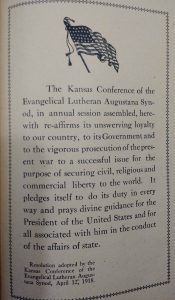After the U.S. declared war on the Central Powers in April 1917, articles related to the war in the Lindsborgs-posten took on a tone much more conducive to promoting loyalty. In September 1917 an article in the Lindsborgs-posten stated that taking one side or the other regarding the war was permissible prior to April 1914, but once the U.S. officially took a side there was an expectation of unquestioned loyalty to the nation. In early 1918 after the abdication of the Russian Tsar, another article in the Lindsborgs-posten declared that Russia’s position in world affairs was significantly weakened, thus making them a threat no longer. On the other hand, German provocations, especially regarding Finland, made that nation more of a menace meaning that its defeat in the war could not come soon enough. Despite these statements in support of American war aims, Swedes and Lutherans in Lindsborg had to answer to questions of loyalty until the end of the war.

Issues of Swedish American loyalty continued in 1918. When the Kansas Conference of the Evangelical Lutheran Augustana Synod met in Lindsborg in April, they wired a statement to President Wilson expressing their loyalty to the United States Government in its efforts against the Central Powers. The statement, written in English and accompanies by an American flag, appeared in the minutes of the meeting. The President thanked the Lutheran Swedes for their loyalty to the country in a message wired back to them.
